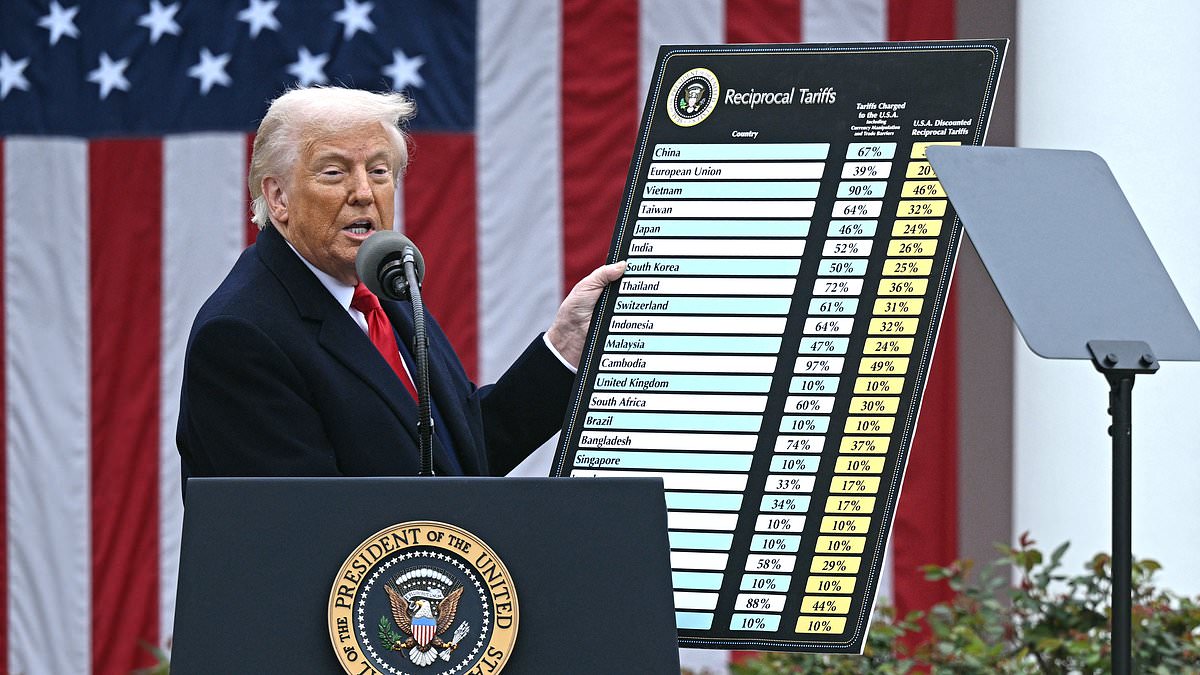President Donald Trump’s global tariffs were declared illegal and blocked by a federal court on Wednesday in a massive blow to his administration.
The ruling from a three-judge panel at the New York-based Court of International Trade came after several lawsuits from Democratic-led states and a group of small businesses argued Trump had wrongfully invoked an emergency law to justify the levies.
The court agreed.
‘The Worldwide and Retaliatory Tariff Orders exceed any authority granted to the President by IEEPA to regulate importation by means of tariffs,’ the court wrote, referring to the 1977 International Emergency Economic Powers Act.
The White House blasted the decision.
‘Foreign countries’ nonreciprocal treatment of the Unites States has fueled America’s historic and persistent trade deficits. These deficits have created a national emergency that has decimated American communities, left our workers behind, and weakened our defense industrial base – facts that the court did not dispute,’ White House spokesman Kush Desai said.
‘It is not for unelected judges to decide how to properly address a national emergency. President Trump pledged to put America First, and the Administration is committed to using every lever of executive power to address this crisis and restore American Greatness.’
The Trump administration is expected to appeal and the legal battle is likely to end up in the Supreme Court.

President Donald Trump’s tariffs dealt massive blow – above he announces his plan
The ruling focused on the sweeping 10% tariffs the president put on virtually every U.S. trading partner last month, with higher tariffs threatened for dozens of countries.
The president used a 1977 federal economic emergency law to justify a range of levies – from duties on Canada, Mexico and China imposed over fentanyl smuggling to the reciprocal tariffs levied in early April on virtually every U.S. trading partner.
Read More
BREAKING NEWS
Trump to revoke visas for some Chinese students as Rubio announces 'aggressive' crackdown

Trump later paused the reciprocal tariffs for 90 days to allow for negotiations.
But at least seven lawsuits challenged the tariffs, which the centerpiece of Trump’s trade policy.
The president, in a massive Rose Garden ceremony in April that he dubbed ‘Liberation Day,’ imposed tariffs on most of the countries in the world in an effort to reverse longstanding trade deficits.
That came after he slammed levies on imports from Canada, China and Mexico to combat the illegal flow of immigrants and the synthetic opioids across the U.S. border.
Some countries hit back with their own taxes on U.S. goods while others began negotiations with the administration.
Markets have risen and fallen in the days since as the financial world struggled to deal with the fallout.

A cargo ship loads and unloads foreign trade containers at Qingdao Port in China
Tariffs must typically be approved by Congress, but Trump argues he has the power to act because the country´s trade deficits amount to a national emergency.
The judges said it would be unconstitutional for a law to give the president blanket authority to set tariffs.
The ruling was a massive setback from the president who is facing numerous lawsuits challenging his use of his executive power.
And he’s faced some mocking on Wall Street for his trade policy as it unleashed economic chaos and resulted in a new acronym making the rounds on Wall Street about the ‘TACO trade’, which stands for ‘Trump Always Chickens Out.’
Trump has made a habit of threatening massive tariffs on nations and industries around the world, which send markets plunging, before he ‘chickens out’ days later and doesn’t actually go ahead with the levies.
And Trump fumed when confronted with the mocking TACO Trade term on Wednesday by CNBC reporter Megan Cassella.
He denied that he had buckled and said he won concessions due to the pressure of his tariffs.
He then slammed Cassella for the bold question, saying: ‘Don’t ever say what you said.’
‘That’s a nasty question. To me, that’s the nastiest question,’ he said.
‘It’s called negotiation. You set a number, and if you go down, you know, if I set a number at a ridiculous high number, I go down a little bit, you know, a little bit they want me to hold that number, 145 percent tariff even. I said man, that really got up.’
The ‘TACO’ term was reportedly coined by Financial Times columnist Robert Armstrong in his criticisms of Trump’s tariff approach.
Despite Trump’s defense, for some Wall Street traders, his tariff threats and sudden reversals are becoming as predictable as TACO Tuesday.
That’s the new acronym that has been making the rounds among investors after the president once again threatened to impose a shock 50 percent tariff on the European Union – sending markets dropping – only to announce a sudden ‘pause’ on Sunday.
‘Trump Always Chickens Out’ is the acronym that has been proliferating online and among Trump critics on the airwaves.
